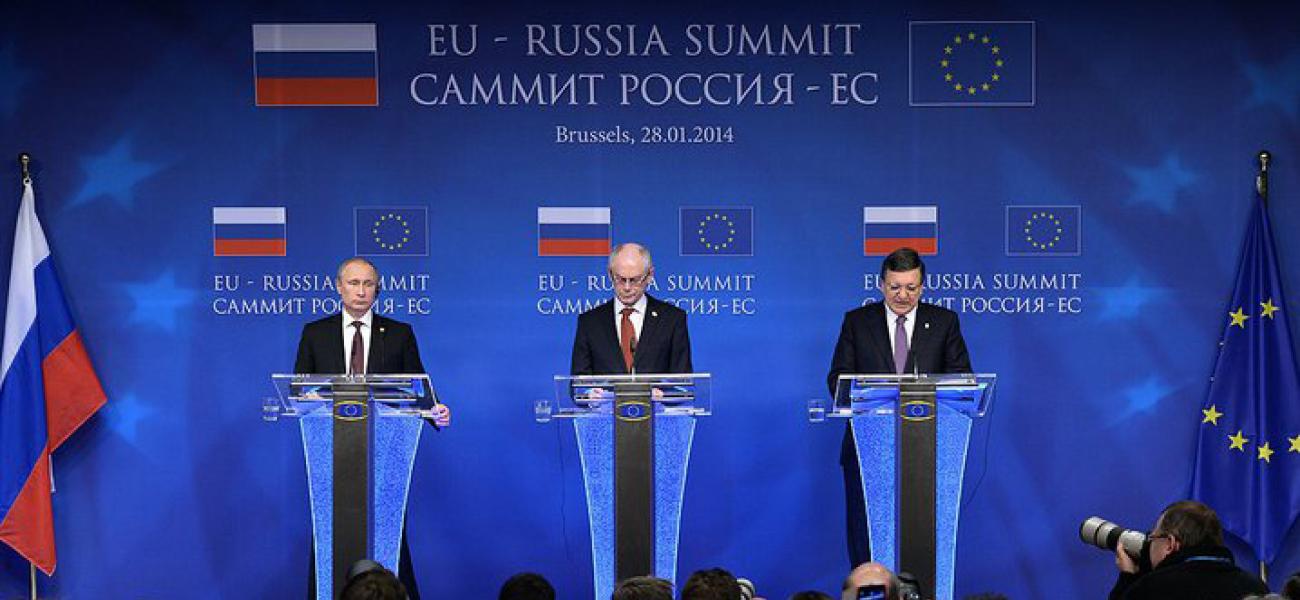With the German chancellor set to retire in 2 years, Macron’s agenda might cohere
Tag: Putin
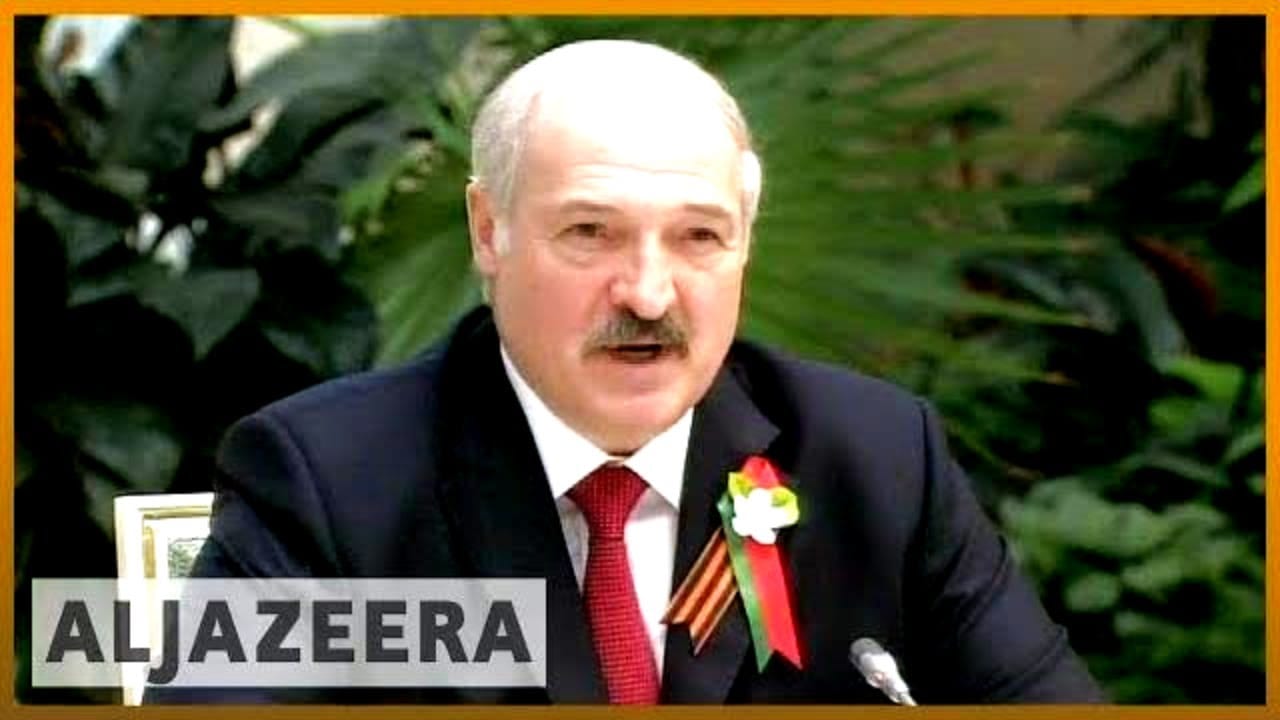
Russians have a proverb – ‘Mend your sails while the weather is fine’, this means that success of the business largely depends on preparation for it.
It seems that the Russian president is far from disregarding this conventional wisdom especially given the fact that he has a power over a huge and resourceful state in his hands and he needs to retain it in the times of aggravating crisis. Therefore, the country leaders often use mythical threat from the outside as mobilization strategy.
Despite of the record votes gained by Putin following spring 2018 elections, people’s dissatisfaction with his domestic policy grows proportionally to exaggerating of economic and social problems: fall of manufacturing, rapid tax growth, unpopular pension reform, restriction of civil liberties, abrupt fall of people’s income etc. Still there is a little cause for optimism, even despite of a tendency towards increase of oil prices, which is the main resource fundamental for the Russian economy for many years.
Kremlin realizes that only success beyond the state may distract people’s attention and boost state leader’s rating. It is proven by Russians’ response to annexation of the Crimea in 2014, when Putin’s rating skyrocketed (86%). However, Kremlin is aware that today a “small victorious war” abroad bears certain risks especially for the state, which has already got bogged down in East Ukraine and Syria facing sanctions and international isolation. Authorities decides to act quietly and, whenever possible, using non-military methods.
Present Kremlin’s rhetoric suggests the conclusion that Belarus will become the next candidate for Russia’s “foreign policy success”. For a long time, its independence from Russia has been nominal. Though both states exist within association named the ‘Union State’, Belarus depends on Russia economically, in particular, in supply of the Russian oil (at below market price), which makes one of the sources of budget income after its processing and reselling to the foreign markets. As a result, Lukashenko is bound to correlate his internal and foreign policy with Moscow. While the Belarusian President affords criticism towards the Russian authorities from time to time, he always supports Kremlin’s actions in the international field. Resonance UN votes on issues disputable for Russia may serve as a prove as far as the Belarusian delegation has always taken the part of Moscow.
Quite recently, in the middle of December, 2018, the Russian Prime Minister Medvedev demanded from the Belarusian leadership in rigid, almost categorical manner strengthening of “integration” between two states. Referring to the treaty on the ‘Union State’, the head of the Russian government declared the beginning of the process of supranational structure’s creation for implementation of the unified legislation and tax system. By the way, the treaty provides establishing a single parliament and creation of single currency and national symbols.
To tell that Minsk was taken aback by such statement – not to tell anything. The Belarusian President urgently arrived to Moscow to negotiate with Putin, but apparently, they did not yield desirable result. And four bags of the Belarusian potato presented by Lukashenko to the Russian colleague did not help. The Belarusian President counted that he will manage to ensure smooth transition of the power to “crown prince” (the illegitimate son Nikolay) …
All these are jokes, but in fact, a process of Belarus absorption has already started. Certainly, it is not a question for one day, but Putin has quite enough time for implementation of his plans. This process most likely will have been completed by 2024 and the same year the next presidential elections are taking place in Russia. Probably Putin counts that peaceful “accession” of Belarus will allow to improve his personal rating, to distract attention of electorate and under the guise of elections of the head of new ‘Union State’ to carry out safe transit of the power. Let’s say once again, the Kremlin does not consider an option of force accession of the neighboring state today, and intends to make everything silently and, as if, voluntary. Naturally, in so doing nobody will ask the opinion of the Belarusian leadership and, in particular, of the Belarusian people…
Except for obvious ignoring of all international standards and laws such absorption bears in itself serious threats for safety of the European continent. First, Russia receives some kind of military base, especially in opposition against Ukraine and the Baltic states. Secondly, it strengthens its position in the European market as exclusive supplier of energy carriers, having an opportunity to dictate its terms. Such silent annexation is dangerous, because it also stimulates the aggressor to further actions. It is worth reminding that in the thirties of the last century a well-known tactics of “pacification of an aggressor” allowed Hitler at first to seize some countries without blood and any consequences and then to launch the world war resulted in tens of millions of victims and the destroyed continent. Therefore, perhaps, it is worth changing tactics of a pacification of an aggressor to more effective measures for preventing grand plans of Kremlin’s “gatherer of the lands”, otherwise it may be …
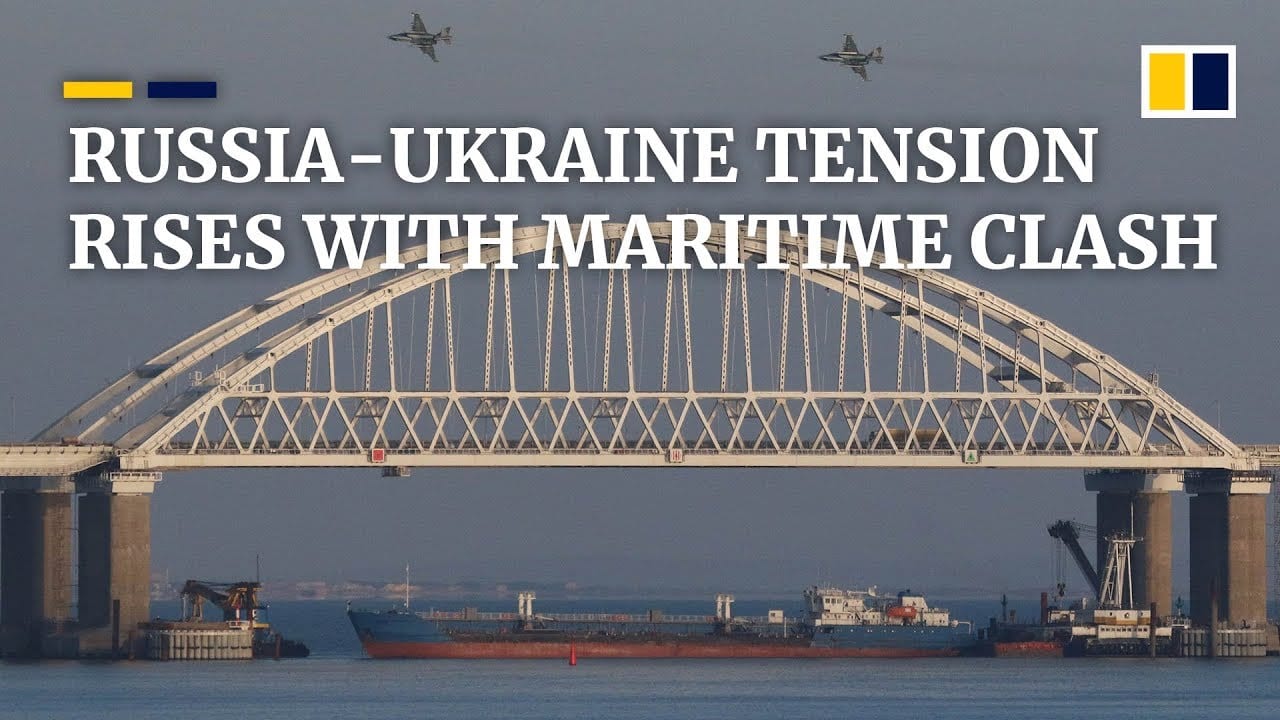
Russia extends its aggression in the Azov/Black Sea region
Act of military aggression by Russia near Kerch strait constitutes the new phase of Russian aggressive policy of de-facto occupation of Azov Sea. On November 25, 2018 Ukraine’s warship group was blatantly attacked by the Russian border guard patrol near Kerch strait. Three Ukrainian military ships were shot at and seized by the Russians in neutral waters on their way back to Odesa port. 23 Ukrainian servicemen are captured (the navy suffered casualties: 6 wounded, including 2 in critical condition).
Russia’s provocations clearly fall under the UN definition of the aggression. The United Nations Convention on the Law of the Sea guarantees the rights of Ukraine as a coastal state in waters near the Crimea and the Kerch Strait. Thus, according to Article 2 of the Convention, sovereign rights of Ukraine as a coastal state extend to its territorial waters (within 12 miles) around the Crimean peninsula, even despite unlawful temporary occupation of it by the Russian Federation.
The actions of the Russian Federation regarding the prevention of the passage of warships in the territorial sea of Ukraine, including the attack on the Ukrainian naval forces’ ship «Yani-Kapu», constitute a violation of Article 2 of the Convention.
The next step of Russia on November 25, 2018 was blockade of three Ukrainian ships in the Kerch Strait. The Russian Federation artificially created obstacles for the passage by ships through the Kerch Strait, which is an international duct in the sense of Article 38 of the UNCLOS, and therefore Russia’s actions constitute blocking of navigation through international duct, which is a violation of Articles 38 and 44 of the Convention.
Actions in the Kerch Strait are also a violation of the bilateral Agreement on the use of the Azov Sea and the Kerch Strait, which envisages free passage of the parties’ warships through the Kerch Strait. By its actions, Russia has actually recognized that the Treaty is null and void.
Ukrainian ships have left the Kerch Strait and were moving towards Odesa, after their exit from the territorial waters in the exclusive economic zone of Ukraine they were attacked, stopped and then detained by the Russian Federation. These actions constitute a flagrant violation of the United Nations Convention on the Law of the Sea, namely the interference with and prevention of free navigation and freedom of navigation in the exclusive economic zone, guaranteed by Articles 56, 58, 88, 92, as well as violations of the immunity of warships, envisaged by the Article 32 of the UNCLOS.
The attacks by the Russian Federation on the Ukrainian naval forces’ ships, which moved towards the port of Berdyansk initially in the Black Sea, and then also in the region of the Kerch Strait, constitute another fact of ongoing aggression against Ukraine.
In accordance with UN GA resolution 29/3314 of 14 December 1974, notwithstanding the declaration of war, the act of aggression is an attack of the armed forces of one country on land, sea or air, or on the naval or air forces of another country (article 3d).
Martial law is a critically necessary response to Russian escalatory policy. Russia is trying to turn it into its internal lake by blockade of Berdiansk and Mariupol and by military buildup in Crimea and Azov Sea. Russia has switched from hybrid to overt military aggression. Shooting to kill in Ukrainian sailors and ramming Ukrainian boats, which conducted a legitimate and peaceful maneuver, is a blatant and barefaced use of military force.
As Ukraine enters a critical phase of elections, Russia increasingly activates its hybrid toolbox. Military escalation is one of such tools of meddling.
Fake elections in Donbas in November 2018 reset a spiral of instability and violence. Last time in 2014 fake elections became a preparation for Debaltsevo full-fledged attack.
Actions in the Kerch Strait indicate the creation of prerequisites for the complete blockade of the seaports of Berdyansk and Mariupol, as well as the preparation for a possible full blockade of the Black Sea coast of Ukraine by Russia.
Thus, on November 26, 2018, the Parliament of Ukraine adopted the martial law for limited period – 30 days, in 10 regions of Ukraine in order to create all prerequisites for proper counteraction to Russian acts of aggression.
Prompt and consolidated international reaction must ensure that Russian aggression will not go unpunished. The Russian Federation is fully responsible for the escalation in the Azov and Black Seas and undermining the peaceful settlement of the Russia-Ukraine armed conflict. On the request of Ukraine, the special meeting of the UNSC was held. Nobody believes Russia, isolation of Russia is obvious.
Dramatic escalation of the situation in the region needs a prompt reaction to:
demand Russia to immediately release 23 captured Ukrainian soldiers and 3 ships;
de-escalate security situation;
ensure sustainable unblocking of the free crossing of the Kerch-Yenikale canal and freedom of navigation in Azov sea according to international law;
elaborate of a new set of sanctions aimed at addressing the situation in the region, including against the Russia’s Azov ports, imposition of additional individual, economic and sectoral sanctions;
ensure permanent posture of allies, including NATO military ships, in the Black Sea;
conduct with NATO joint trainings in the Sea of Azov;
provide Ukraine with effective radar to monitor the maritime situation in the region, as well as with naval defense systems;
establish OSCE SMM monitoring in the area of the Sea of Azov and Kerch strait;
support Ukraine’s UN GA draft resolution on the militarization of the Crimea and the Sea of Azov;
Escalation of aggression by Russia is a clear evidence that NS2 should be immediately blocked. If Ukraine will lose its significance as a transit country may encourage Putin to wage a full-scale war to take over Ukraine.
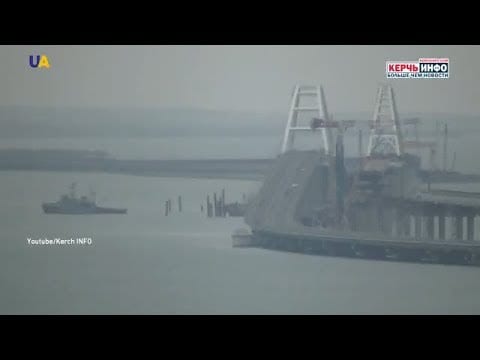
How do you think, what is the most difficult to prove?
The president of the Russian Federation Vladimir Putin presented to the whole world his vision of the answer to this question. It appears the obvious things are the most incredible to prove.
All Russian actions aimed to break down the international law and stability in the world hide conveniently behind this Putin’s formula.
Let’s take illegal annexation of the Crimea. The Kremlin presented it as the Crimeans’ will and a return of the peninsula into the motherland’s fold: “Any violence! Fair referendum and point!” However, there are many proofs that it is nothing, but the armed occupation of the other state’s territory. “Prove it!” – Putin is mocking.
Another example – unleashing of armed conflict in Donbass and creation of the so-called DPR/LPR separatist entities. Everything is obvious, once again. There is a set of evidences of direct Russian military aggression and presence of the Russian servicemen there. The Kremlin says: “We are not present there. Prove it… Only miners and peasants are at war with the Ukrainian junta, using equipment and arms which they bought via the Internet in the world Army Surplus…”
What about civil Boeing? Who did shoot down it? Anyone, beginning from drunk Ukrainians and finishing by aliens, but only “not us”. Although, the obvious facts will become a trial subject with the obvious verdict soon.
Apparently, using of the chemical weapon in the Great Britain is evident! We can hear again: “It’s not us. Prove it…”
What are we dealing with? The Free World put up with it. Sanctions have been declared for conscience’s sake. Nevertheless, cooperation with the aggressor continues: Northern and Turkish Streams are being built; Mr. Putin is being received as an honorable guest at weddings and festive events, orban, zeman, salvini dote on Putin.
Finally, there is a new fact of the Kremlin’s aggression against the sovereign state. Having annexed the Crimea, thanks to the constructions of Kerch Straight Bridge (besides illegal), Putin cynically realizes the project of the Azov Sea blockade. Naval Forces of Russia carried out a naked military action against the Ukrainian ships to receive a formal reason for full closing of the Kerch Strait and blockade of the Ukrainian ports on the Azov Sea.
Everything is extremely obvious! This time things have gone far enough and presented a risk of a direct military clash with Ukraine with unpredictable consequences. Dear Sirs in Brussels, Bonn, Paris and Washington, is it obvious for you now that you should react rigidly to this accident up to rendering effective military support to Ukraine?
Or do you still need any more evidence else?!
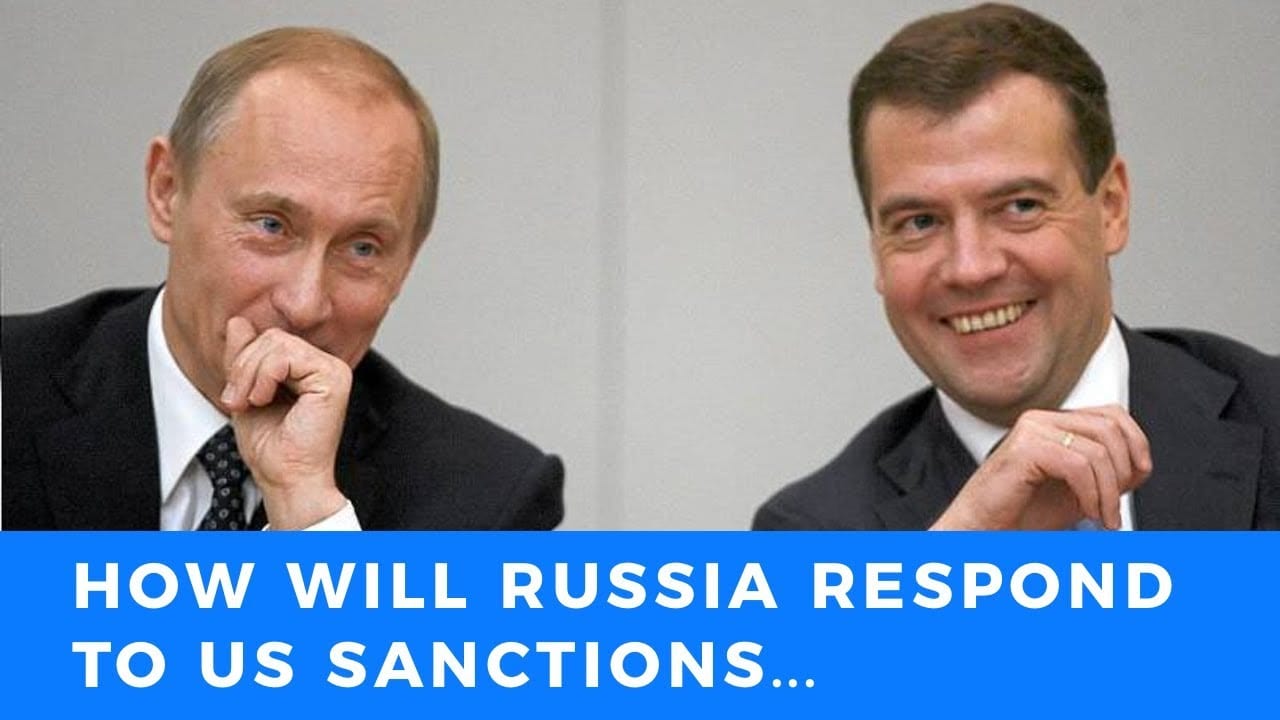
The hypocrisy is taking over in the West: the aggressor state’s president Putin (which is waging propaganda war against the Western world) has managed to break international isolation. The number of Kremlin’s friends is increasing in the West.
The West is tired of confrontation with Putin: each time sanctions are prolonged forcedly, but Moscow has accommodated itself to such situation and does not face any serious problems because of restrictive measures.
However, since the annexation of Crimea, the West policy has never been coherent. Now, after the split of the West and after the election of American president who is afraid of Putin, the latter is using the situation for promotion of his own imperial ambitions.
The West was not split by itself, but the Russian president-aggressor did it: one part of western establishment condemns him, another part considers him as a strong leader whose public image is under pressure of Europeans. It was greatly contributed by the “successful” football championship in June. Putin has managed to create an illusion of freedom at the European guests. In fact, while fans were celebrating the victory of their teams, many imprisoners were being tortured and raped in Russian prisons. The great example of the “Russian Themis” is Oleg Sentsov, whose fate remains an important item of agenda for the whole world.
Putin has used vulnerabilities of Europe, i.e., anti-American tendencies and right populist sentiments caused by refugees’ crisis aggravation. Such mentality makes basis of Russians’ perception of the world. Medias, fully controlled by Kremlin, spread these messages via news and talk shows. The average Russian is often homophobe and racist, and is completely incompetent in the field of foreign policy and democratic values and therefore is completely loyal to the “leader”.
Putin’s strategy to deny permanently his participation in military campaigns, including Ukraine, and support of dictatorships around the world has achieved its goals. The discredit of “the world policeman”, the USA, under Trump’s ruling has contributed the same mission. The latter has proved to be unable to confront Putin and is inclining to support him. The fear that once Putin will confirm Russian intervention in presidential elections and its influence over the result – Trump’s victory – is too deep. Such scenario may cause loss of confidence of the US citizens and weaken Trump’s position inside the country. Therefore, Trump is on tenterhooks.
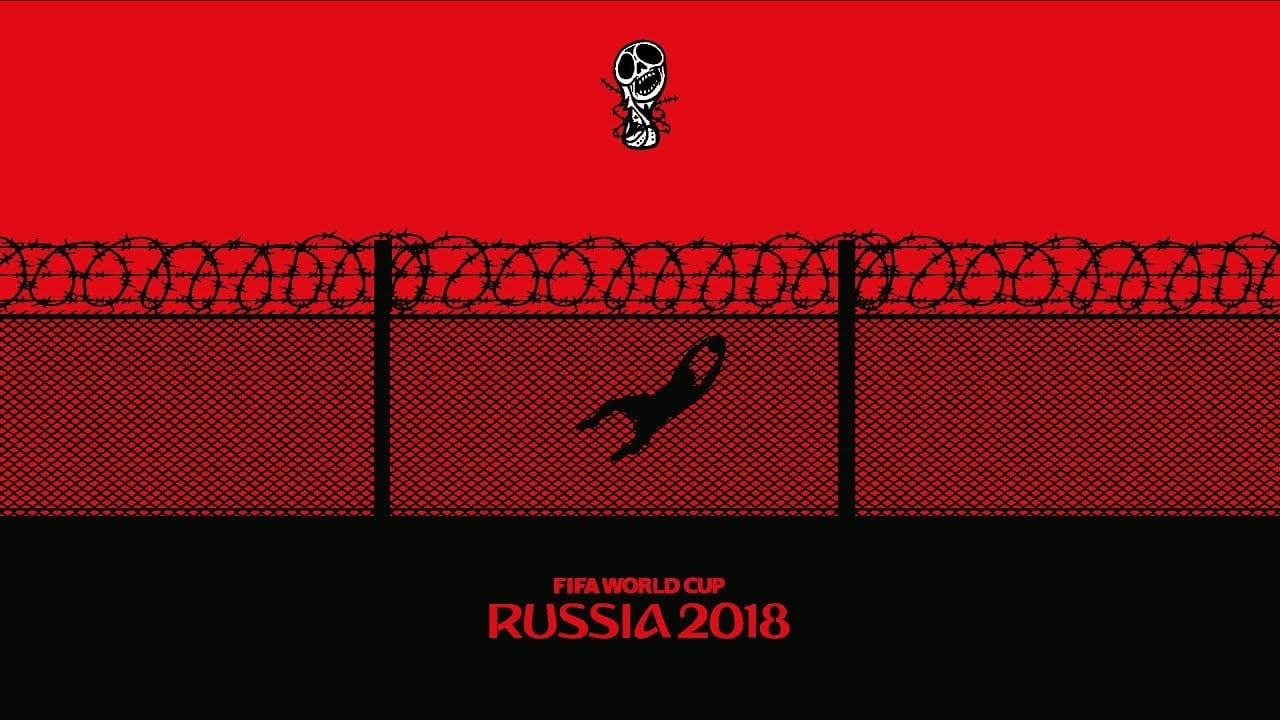
Human life, their rights and freedoms are the supreme value for all civilized world in the 21st century. Anywhere but in Russia and in the annexed Crimea where people faces a threat of being hurled into prison for their beliefs and a civic stand on far-fetched charges. Statement of charges may vary, though the fact that those dissident in Russia are represented either as saboteurs or as criminals and terrorists remains unchanged. Meanwhile, the Kremlin cynically denies all the facts that prove extreme violations of human rights in Russia.
The Russian authorities do not consider annexation illegal and declare it was historical justness that was restored following the results of the so-called national referendum in the Crimea in 2014 (at the point of a guns of people in military uniform without identification marking). Kremlin also denies the participation in the military conflict in the east of Ukraine. However, the Russian authorities do not even take pains to explain constantly increasing number of citizens of Ukraine and of the Crimean Tatars among political prisoners in the Russian prisons. Today, according to representatives of non-governmental organizations, more than 70 Ukrainian citizens are kept in places of detention in the territory of Russia and in the Crimea. Among them are the following:
– 27 Crimean Tatars who expressed an outrage against annexation of the Crimea. 4 of them were sentenced to 5 – 12 years of imprisonment on a charge of participation in the Islamic organization Hizb Ut-Tahrir forbidden in Russia;
– other 23 Crimean Tatars are waiting for trial being accused of various crimes: of membership in Hizb Ut-Tahrir, of participation in the pro-Ukrainian associations in the Crimea during the pre-annexation period, or are accused of far-fetched charges of ‘blackmailing’ (arrests of the Crimean Tatar activists are going on);
– Vladimir Balukh, the Crimean farmer who ran up the Ukrainian flag over his house after annexation of the Crimea was sentenced to 3,7 years on far-fetched charge of ‘illegal storage of ammunition’;
– Roman Souchtchenko, the Ukrainian journalist, was sentenced to 12 years of imprisonment in maximum security penal colony for alleged ‘espionage’;
– Stanislav Klykh, professor of history, and Mykola Karpiouk, representative of the Ukrainian nationalist movement UNA-UNSO, were arrested in Russia in 2014 and sentenced to 20 and 22,5 years of imprisonment in colony for alleged ‘participation in military operations’ against Russia in Chechnya in the nineties;
– Pavlo Gryb, blogger, the youngest Ukrainian political prisoner (19 years) who was arrested by the Russian security services in 2017 in Belarus and accused of preparation for terrorist attack in Sochi, sentenced to 10 years of imprisonment;
– Oleg Sentsov, stage director and participant of the Revolution of Dignity, is sentenced to 20 years of imprisonment in maximum security penal colony for ‘terrorism’;
– Oleksandre Koltchenko, ecologist, manifested his revolt against Crimea annexation, was arrested together with Sentsov and sentenced as the accomplice to 10 years of imprisonment in colony for ‘terrorism’ (https://www.epochtimes.fr/les-prisonniers-politiques-ukrainiens-detenus-par-la-russie-343007.html).
According Amnesty International’s data, Sentsov and Kolchenko were subjected to tortures and bashing after arrest. Trial against them is very much similar to repressions of Stalin times. According to Soviet dissident’s daughter Zoya Svetova who personally appealed to the President of France Macron to assist in putting an end to political repressions against Sentsov and Kolchenko, she “sees the doctored cases and political prisoners in Russia”. Sad to say, the situation remains unchanged, despite personal addresses to the Russian president of such famous Russian stage directors as Alexandre Sokourov and Andreï Zviaguintsev, as well as representatives of the European cultural society.
On May, 14th, 2018 Oleg Sentsov accused of terrorism and condemned to 20 years of a strict regime colony by the Russian authorities for the public protest against annexation of Crimea has begun his hunger-strike with a unique demand to free all political prisoners kept in Russia. His lawyer Dmitry Dinze is convinced, that Oleg will go to the end. “Together we stand untill the end!”, – these are words from Oleg’s letter. Natalia Kaplan (his cousin) in her interview for The Independent said, “his exact words to us were that if he dies during the World Cup he would be happy for having drawn attention to Ukrainian political prisoners.”
A variety of the international organizations support Oleg Sentsov demanding to free him and political prisoners held in Russia. Representatives of EU member-states, OSCE, PACE, French national centre of cinematography, German national academy, the participants of the Cannes and Berlin film festivals, PEN International, and also known writers, cultural figures, Russian scientists have required to liberate Oleg.
Late in May members of the European film academy sent to the Russian president the open letter demanding for Sentsov’s liberation. It was supported by the creative community of many countries of the world, among them such known people as Pedro Almodóvar, Wim Wenders and Ken Loach, Аki Каurismaki, Mike Lee, Bela Tarr and many others. Recently Open Democracy has published an appeal to leaders of all countries asking to refrain from visiting World Cup-2018 in Russia unless all Ukrainian political prisoners will be released by that time. It was signed by Anne Applebaum, Timothy Snyder and many others.
Despite such hard-line response from the world community, Kremlin states that there are no political prisoners in Russia, justice is independent, so all these people are dangerous criminals and will receive “just punishments”. Such statements demonstrate cynicism of the higher degree as history of each political prisoner is well-known to public, and litigations concerning them drew a wide response. Nevertheless, the Russian power and personally Mr. Putin don’t consider it necessary to react both to opinion of own citizens, and to opinion of the international community.
In the situation, when such people as Oleg Sentsov sacrifices his life to rescue tens of other lives and to draw attention of the world community to reversion of Russia in days of Stalin reprisals, the smallest we can do is to boycott World Cup-2018 and any other international events held by Russia, thus showing resolution and unity in struggle for the higher values – for the HUMAN LIFE!
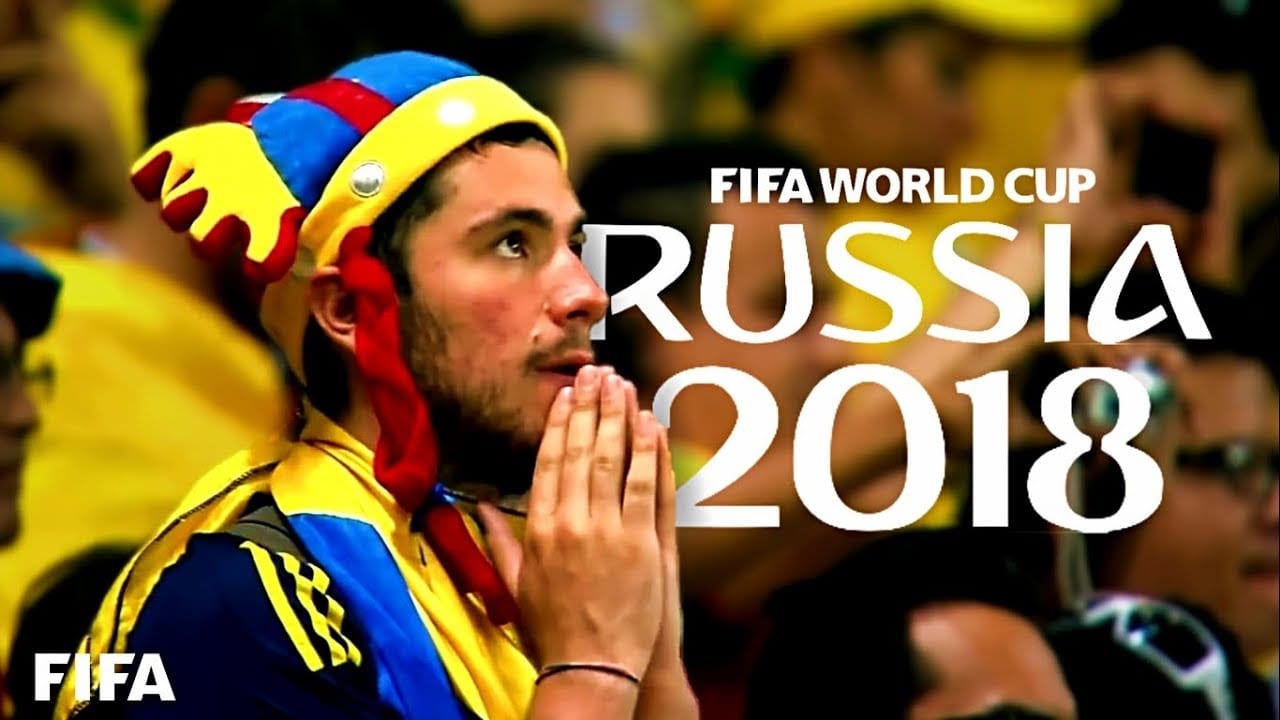
After 14 long months of suppression to the release process of the Ukrainian hostages in Donbas, Kremlin has suddenly set about its continuation. Acting in a manner of the long-standing gangland tradition – making a problem first to simulate the assistance in its resolution thereafter – Putin has yet again illustrated extreme cynicism of the Russian aggressive policy.
Well, that is Russia that hit Ukraine, launched the war and occupied Ukrainian territories. Naturally, military aggression was accompanied by prisoner snatch, both military and civil. And now Russian leader broke into humanism.
Why then just now? It seems that after all, sanction mechanism affects on aggressor, showing signs of inevitability of considerable and even completely unacceptable financial and economic, reputational and diplomatic, political and humanitarian damage.
That’s exactly why Putin has organized pacifist performance to bring himself gentle and humane politician before the world, doing his best in behalf of peace in Ukraine and, therefore, in no way being an aggressor. He expresses commitment to exchange prisoners, accepts peacemakers, and personally coerces Zakharchenko and Plotnitskiy (leaders of separatist movements in Donbas) to humanism; he even settled almost everything with USA. Well, elections are coming soon…
Yet, if the motto ‘Krymnash’ (‘Crimea is ours’) has already become trivial and Novorossiya project got bogged down in war of positions, then Putin may become ‘a great peacemaker’ instead of ‘a gatherer of Russian lands’, which is also by no means bad.
What is more, the final part of the FIFA World Cup is coming, which starts just after the anticipated inauguration (who then still doubts?) of Vladimir Putin. Considering exceptional reputational importance of this event to demonstrate the whole world the mightiness and majesty of modern Russia and particularly of its leader, the risk of changing the hosting country shall be treated as unacceptable damage.
However, too many problems accompanies Russian championship, from quite doubtful story of awarding hosting rights for the World Cup by Russia and a range of doping scandals in Russian sport to their intervention in elections of other states. No wonder Putin attempts to present himself progressive, democratic leader and simply a good guy. That reminds situation before Sochi Olympic Games in 2014. At that time shortly before the Games Putin granted a pardon to Khodorkovsky and decriminalized PussyRiot. Though, following the Games closure, one by one Russia occupied and annexed Crimea and initiated massacre in Donbas.
Human lives are of utmost importance. Every chance shall be used for their rescue. If Putin’s declarations may help hostages come home, it should be welcomed. Yet, let’s wait till the next negotiations in Minsk on November 20th. They may clarify shall the change take place and what will be its terms.
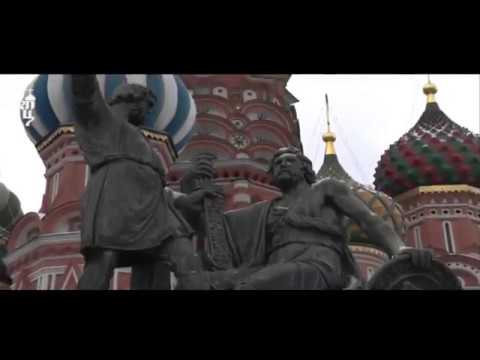
In the midst of increasing political and economic pressure on Russia due to its aggressive expansionist policy the position of some European states, the leaders of which declare unequivocally their dissent from such Brussels’s policy, seems to be quite strange.
Hungary takes active part in lobbying lifting sanctions against Russia, which not only maintains top-level close ties with Russia, but also works for extending cooperation. Specific relationships between Budapest and Moscow are proven by the fact that Hungary became the only European state visited by Putin twice for the last half-a-year.
Frankly pro-Russian position of the Hungarian authorities has quite prosaic reasoning. Hungary depends heavily on supply of Russian energy products. In addition, Moscow peps up quite effectively (through financial means) the interest of Hungary in maintaining close friendly relations. Kremlin’s decision to provide Budapest with credit in the amount of 12 billion euro for construction of the Paks II Nuclear Power Plant serves as the striking example. The amount is quite impressive, isn’t it? The start of the construction with direct involvement of Russian companies is scheduled for January 2018. This scale project will afford Russia not only tie the operation of Hungary nuclear power plant to them and create additional workplaces for their citizens, but also market the technologies in the field of nuclear energy at European level. Obviously, in consideration of the economic support, Kremlin reckons on the Budapest’s loyalty in the issues of foreign policy and lobbying of Russia’s interests on the international scene, particularly in the issue of lifting sanctions.
Moscow not only buys Budapest for credits, but also efficiently uses historical claims of Hungary and growing revanchist spirits inside the state. Current Hungarian authorities have repeatedly declared their intention to turn the lands inhabited by ethnic Hungarians to the “parent body”. This fact unites Hungary and Russia.
Budapest does not transmit such ideas internationally, though they keep stirring up the idea of “Great Hungary” within the state attempting to attract the voters. Similarly to Moscow, in pursuing their aims they stake on strengthening the ties between Hungarians living abroad and their historical Motherland. Certainly, there’s nothing wrong that Hungarian authorities supports in every possible way and provide funds for public organisations, educational projects, infrastructure and medicine development, etc. at the areas of their compact settlement abroad. At the same time the fact that Hungary actively uses the ethnic factor not only for inviting workforce to the state, but also as one of the Budapest’s impact tools on bordering states competes attention. In this context the dual citizenship policy promoted by Hungarian authorities (it happens sometimes that issue of Hungarian passports rises to 100 thousand per month) cannot but cause concern of the authorities of neighboring states. Setting the pension registration mechanism for those citizens living abroad, Budapest gave an impetus to this process which resulted in aggressive growth of the number of ethnic Hungarians who have dual citizenship in Romania, Slovakia, Ukraine and Serbia.
All this happens amidst the growth of extreme right, pro-Russian and Euro-skeptic spirits as well as the government’s support of nationalistic Hungarian organisations abroad. Hungarian nationalists are the primary driving force for the implementation of the idea of “Great Hungary”. Particularly, they are actively committed to granting Hungarians the autonomy within the areas of their compact settlement in Ukrainian Zakarpattia, Székelyföld in Romanian Transylvania, Danube regions of Slovakia, Vojvodina in Serbia. Hungarian imperial ambitions stirring up by Kremlin, as well as growing autonomist aspirations among the Hungarian minority aggravate the outlined negative trends in the EU (British Brexit, reinforcement of the Rights in France and recent Catalonian demarche).
With due account for these conditions, as well as for Kremlin’s involvement into the destructive actions focused on disruption of the EU and NATO unity, the friendship between Budapest and Moscow does not seem to be so harmless.

There are good grounds for believing that the Russian special services control all
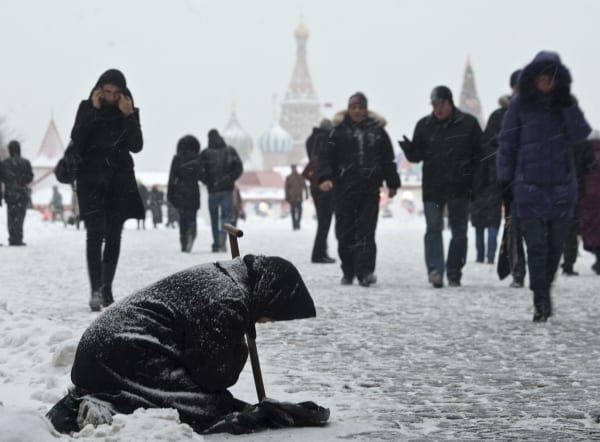
According to the National Welfare Fund of Russia, the living standard in Russia is
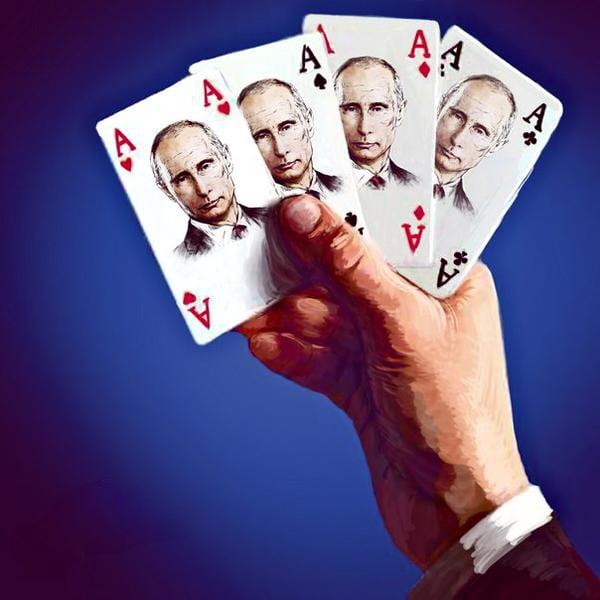
According to the latest sociological surveys, held in Russia, citizen’s confidence in state authorities
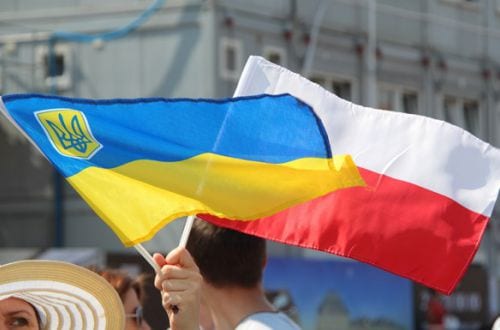
Evidently you have already heard of the sensational premiere of the Wojciech Smazhovski’s new
